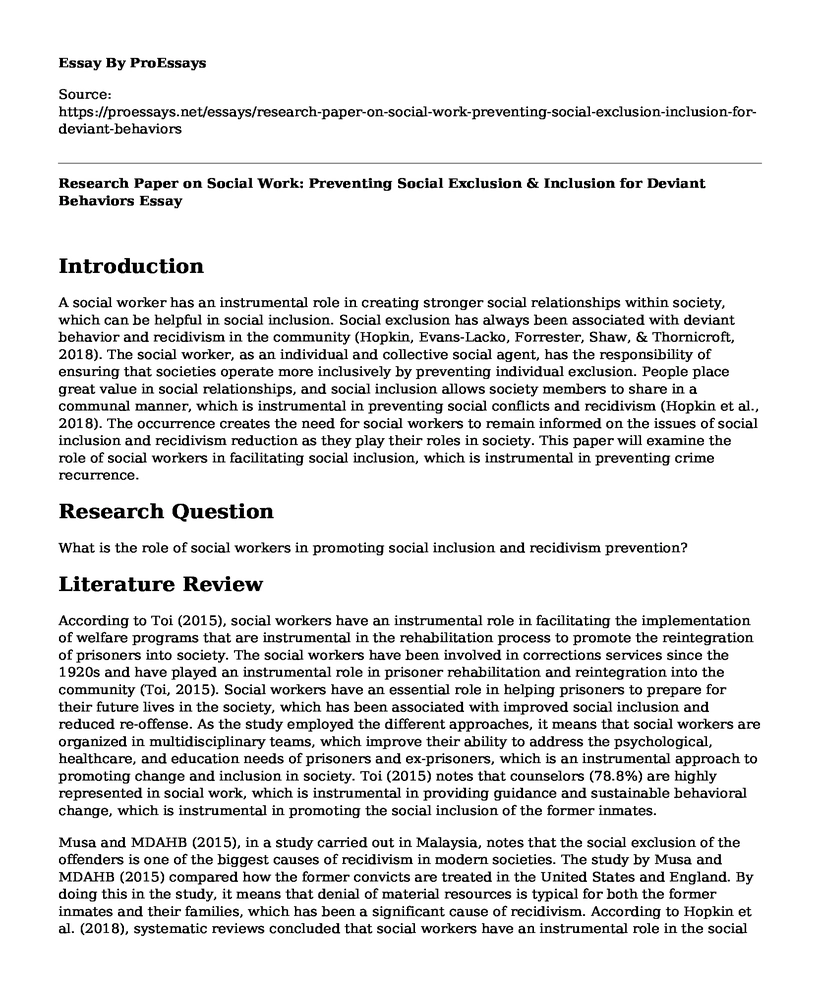Introduction
A social worker has an instrumental role in creating stronger social relationships within society, which can be helpful in social inclusion. Social exclusion has always been associated with deviant behavior and recidivism in the community (Hopkin, Evans-Lacko, Forrester, Shaw, & Thornicroft, 2018). The social worker, as an individual and collective social agent, has the responsibility of ensuring that societies operate more inclusively by preventing individual exclusion. People place great value in social relationships, and social inclusion allows society members to share in a communal manner, which is instrumental in preventing social conflicts and recidivism (Hopkin et al., 2018). The occurrence creates the need for social workers to remain informed on the issues of social inclusion and recidivism reduction as they play their roles in society. This paper will examine the role of social workers in facilitating social inclusion, which is instrumental in preventing crime recurrence.
Research Question
What is the role of social workers in promoting social inclusion and recidivism prevention?
Literature Review
According to Toi (2015), social workers have an instrumental role in facilitating the implementation of welfare programs that are instrumental in the rehabilitation process to promote the reintegration of prisoners into society. The social workers have been involved in corrections services since the 1920s and have played an instrumental role in prisoner rehabilitation and reintegration into the community (Toi, 2015). Social workers have an essential role in helping prisoners to prepare for their future lives in the society, which has been associated with improved social inclusion and reduced re-offense. As the study employed the different approaches, it means that social workers are organized in multidisciplinary teams, which improve their ability to address the psychological, healthcare, and education needs of prisoners and ex-prisoners, which is an instrumental approach to promoting change and inclusion in society. Toi (2015) notes that counselors (78.8%) are highly represented in social work, which is instrumental in providing guidance and sustainable behavioral change, which is instrumental in promoting the social inclusion of the former inmates.
Musa and MDAHB (2015), in a study carried out in Malaysia, notes that the social exclusion of the offenders is one of the biggest causes of recidivism in modern societies. The study by Musa and MDAHB (2015) compared how the former convicts are treated in the United States and England. By doing this in the study, it means that denial of material resources is typical for both the former inmates and their families, which has been a significant cause of recidivism. According to Hopkin et al. (2018), systematic reviews concluded that social workers have an instrumental role in the social inclusion of the former prisoners. Social workers are involved in the provision of housing, employment, family relations, and financial planning in the pre and post-release periods in prisoner life. Through such a development, it outlines the significance of the instrumental in improving the social inclusion of the former prisoners.
Literature Review Key Findings
From the literature, all the authors and studies agree that social workers play an instrumental role in the social inclusion of the prisoners, which reduces recidivism. Different countries have benefited through social inclusion work, which is conducted in post or pre-release from the prison. The social workers offer a holistic approach and intervention in providing services that are instrumental in reducing reoffending by former inmates. The study observes that it is typical for former inmates and their families to experience social exclusion. However, further qualitative and quantitative research is necessary to address the issue of gaps in social inclusion practices and how social workers can be facilitated to contribute more towards reducing recidivism.
References
Hopkin, G., Evans-Lacko, S., Forrester, A., Shaw, J., & Thornicroft, G. (2018). Interventions at the transition from prison to the community for prisoners with mental illness: a systematic review. Administration and Policy in Mental Health and Mental Health Services Research, 45(4), 623-634. Retrieved from https://www.ncbi.nlm.nih.gov/pmc/articles/PMC5999162/
Musa, A. A., & MDAHB, A. (2015). Criminal recidivism: A conceptual analysis of social exclusion. J Culture Society & Development, 7, 28-34. Retrieved from https://pdfs.semanticscholar.org/0d88/c3a20973eefd701da5381ece9fcb441a63b4.pdf
Toi, H. (2015). Professional Values and Conflict among Social Workers in Prisons: An Examination of Role Stress, Strain, and Job Satisfaction in Working with Inmates with Mental Illness and Substance Use Disorders. Retrieved from https://www.bristol.ac.uk/poverty/downloads/keyofficialdocuments/Reducing%20Reoffending.pdf
Cite this page
Research Paper on Social Work: Preventing Social Exclusion & Inclusion for Deviant Behaviors. (2023, Feb 23). Retrieved from https://proessays.net/essays/research-paper-on-social-work-preventing-social-exclusion-inclusion-for-deviant-behaviors
If you are the original author of this essay and no longer wish to have it published on the ProEssays website, please click below to request its removal:
- Syllabus Course on the Introduction to Fields of Addiction Review Paper
- Fall Reduction With Multifactorial and Nursing Intervention Essay
- New Approach to Minimize Postoperative Pain in Bariatric Surgery Paper Example
- Essay Sample on Maxime Fitness Company
- The Process of Budgeting in Nursing Paper Example
- Exclusive Breastfeeding: AAP & ACOG Recommendations - Essay Sample
- Virgin Australia Collapses: Unseen Cause of Troubles Revealed - Essay Sample







